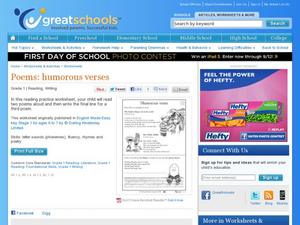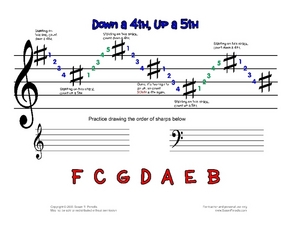K12 Reader
The Pot is Hot
What do a pot and a robot have in common? They both end in -ot! Kids practice their -ot words by reading the short poem included here and then tap into reading comprehension skills by answering the three questions.
DePaul University
The Football Team
Playing team sports is about more than just scoring the most goals or winning the most games. Read this passage with your class and learn how athletes build character as members of a team. When finished, individuals identify the main...
K12 Reader
Look at the Good Wood
Practice the oo digraph with a quick text and related questions. The short poem includes plenty of examples of the digraph. After reading, learners respond to the three reading comprehension questions.
K12 Reader
Fun in the Sun
Don't shun this activity based around -un words! Class members read a quick poem full of -un words and then respond to three comprehension questions about the text.
K12 Reader
Who Fell into the Well?
Read this short poem to reinforce understanding of -ell words, like fell and well. Learners also respond to three reading comprehension questions, which are include right on the page.
K12 Reader
The Duck is Stuck
What luck! You've just found a resource that focuses on -uck words. It includes a short poem for kids to read that includes quite a few -uck words as well as three reading comprehension questions.
K12 Reader
The Kid Will Win a Ship
Which word included the short /i/ sound: pirate or ship? Work on the short /i/ sound with your class by using the short poem provided here. Class members read the poem and answer three reading comprehension questions.
K12 Reader
Tap on the Map
Work on -ap words with a straightforward exercise. Class members read a short poem that includes plenty of -ap words and respond to three included reading comprehension questions.
K12 Reader
He Bit the Pit
Move toward mastering the -it words with a brief exercise. Class members read a short poem that includes many -it words and then respond to three included reading comprehension questions.
Curated OER
Writing and Reading Center #3: Subjects and Predicates
Do your young grammarians need practice identifying subjects and predicates? The 20 sentences included in this packet could be used for drill or as a check for understanding.
Curated OER
Reading Comprehension Worksheet: Food
After reading two paragraphs about food, students must answer 4 questions about what they have read. This is a great learning exercise to practice reading comprehension, and would be very helpful practice prior to state testing. The...
Curated OER
Georgia CRCT - 7th Grade Language Arts Quiz
Whether your seventh graders are preparing for the Georgia Criterion-Referenced Competency Test (CRCT) or any other standardized test, this practice worksheet takes them through a variety of language arts skills. Punctuation, grammar,...
K12 Reader
Narrative or Expository?
Narrative or expository? That is the question readers face on a two-part comprehension worksheet that asks kids to read a short passage about these two different types of writing, and then to answer a series of comprehension questions...
K12 Reader
Making Predictions
Prediction as a reading comprehension strategy is the focus of an article attached to a two-part activity. Kids read the article and then use the provided information to respond to the comprehension questions.
Curated OER
Checking Grammar: Accuracy
Get young writers in the practice of editing their work using this punctuation and grammar worksheet. They first read eight sentences with grammar issues, rewriting or checking off as correct. The sentence errors involve subject-verb...
Curated OER
Poems: Humourous Verses
First grade is a great time to build strong reading skills. Here are three short rhyming poems or common nursery rhymes that are intended to help boost reading fluency. Because most children know these rhymes, they will have an easier...
Curated OER
"Killing Chickens" by Meredith Hall
After reading the essay "Killing Chickens" by Meredith Hall, provide your class with these thoughtful questions. After answering the four questions listed, your writers attempt to write their own descriptive essay. Challenge them to...
K12 Reader
Summarize It!
A key reading comprehension skill is the ability to summarize. Here's a worksheet that not only explains how to summarize, but also explains why summarizing is important.
Curated OER
Personal Information
Can your learners fill out an envelope with their personal information? Give them some great practice using this template, which learners will enjoy because it's all about them! First, they write their name and address on an image of an...
Curated OER
Editing
Take young authors through the writing process with a worksheet on editing. Given three sentences with unnecessary words, pupils cross out the extra words and write the rest of the sentence in the space provided. An excellent way to...
Curated OER
Haiku and Cinquain
As you introduce your scholars to haiku and cinquain poetry, give them plenty of opportunity to practice. This brief activity gives an example of each, then scaffolds the syllable breakdowns for writers to create two poems of their own...
K12 Reader
Summarize It: President Theodore Roosevelt's 7th Annual Message to Congress
How did Theodore Roosevelt stress the importance of conservation during his time as president of the United States? Take a closer look at the language Roosevelt used himself in a 1907 address to Congress, and have your young historians...
Curated OER
Review of Compound and Complex Sentences
An excellent language arts worksheet. Learners read seven sentences and determine if each is simple, compound, or complex. In order to practice sentence combining, young writers join 10 sets of sentences to form compound sentences, and...
Curated OER
Down a 4th, Up a 5th
It's time to practice those sharps. Young musicians write the order of sharps by counting down a fourth and up a fifth. This is a great way to teach sharps to emergent musical note readers.

























